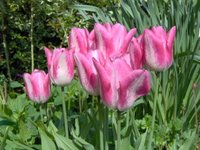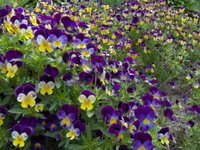Tips to More Sustainable Gardening
Water conservatively – Water your lawn and garden in the early morning, late afternoon or early evening so that the water doesn’t evaporate in the hot sun during the day. Pay attention to the winds, because they can blow away fine droplets of water. Also, remember to water your plants at their base, not on their leaves. Leaves don’t absorb water, the roots do. One way to do this is to use a watering wand on the end of your hose to help direct the spray. If you have an irrigation system, it’s best to control it with a timer so you don’t just leave it on and forget about it, possibly overwatering your plants and wasting water in the process. Another way to reduce your water use in your garden is to use a rain barrel. These catch rain water from your gutters which you can use to water your plants. Furthermore, you should water plants with longer roots (such as shrubs) for longer periods of time but less frequently.
 Employ Integrated Pest Management (IPM) techniques – Integrated Pest Management is a basic system for reducing pests without using chemical pesticides. The first step is to plant a great diversity of plants in your garden and to introduce plants that are naturally resistant to pests common to your area. Monoculture (a large continuous area of a single type of plant) breeds pests; having many different plants will reduce the habitat suitable to any single pest. Reducing monoculture is a preemptive method of reducing pests in your garden. If pests do become a problem, you should use natural pesticides. These are compounds which are naturally produced by plants to deter certain pests. Artificial pesticides should always be your last resort to a pest problem due to their negative effects on the environment.
Employ Integrated Pest Management (IPM) techniques – Integrated Pest Management is a basic system for reducing pests without using chemical pesticides. The first step is to plant a great diversity of plants in your garden and to introduce plants that are naturally resistant to pests common to your area. Monoculture (a large continuous area of a single type of plant) breeds pests; having many different plants will reduce the habitat suitable to any single pest. Reducing monoculture is a preemptive method of reducing pests in your garden. If pests do become a problem, you should use natural pesticides. These are compounds which are naturally produced by plants to deter certain pests. Artificial pesticides should always be your last resort to a pest problem due to their negative effects on the environment.
Use organic fertilizers and compost – Artificial fertilizers have certain negative effects on the environment that some people may not be aware of. The chemicals in them may be harsh and actually harm your plants. Also, they may not always absorb into your soil, instead being washed away by surface runoff. When they enter waterways, fertilizers actually act as pollutants. Organic fertilizers don’t contain these chemicals and are excellent sources of the nutrients your plants need to thrive. Slow release organic fertilizers are a better option than other fertilizers because these require less frequent applications. Also, they don't entice gardeners to apply a lot at once because excess fertilizer will not be absorbed; it will be washed away into rivers and lakes where it wreaks havoc on aqautic ecosystems. An alternative to buying fertilizers is to create a compost pile in your yard. Composting naturally produces nutrient rich soil by breaking down organic compounds. This will help reduce your need for purchasing fertilizers.
 Plant plants native to your climate – Native plants require much less care than nonnative ones do. Plants not accustomed to the climate (the average temperature and precipitation) of your area will require more attention, be it more water, less water, more nutrients, etc. They will not grow as well as native plants without highly specific care. Native plants, on the other hand, will do much better with less care. They may also be more resistant to pests in your area.
Plant plants native to your climate – Native plants require much less care than nonnative ones do. Plants not accustomed to the climate (the average temperature and precipitation) of your area will require more attention, be it more water, less water, more nutrients, etc. They will not grow as well as native plants without highly specific care. Native plants, on the other hand, will do much better with less care. They may also be more resistant to pests in your area.
Plan your garden – Placing plants close together is a good technique to reduce the intrusion of weeds by creating a dense cover over the soil. It will also reduce the amount of water lost to evaporation. Pay attention to the needs of your plants. By grouping plants with similar water needs, you can more efficiently tend to these different needs without over- or underwatering other nearby plants. However you should also keep the other needs of the plants in mind, such as sunlight and soil acidity. Something you may want to consider is to let part of your garden grow wild. Wild growth requires less care, and you never know what new plants might pop up.
Reduce lawn or turf grass cover – Your lawn is a field of monoculture; one species alone growing in an area would not occur in nature. This lack of biodiversity is not healthy for your garden. Lawns require a lot of water, fertilizer and work to maintain, and are breeding grounds for pests. Lawn areas reduce the absorption of water by soil and are therefore conducive to runoff and erosion. Reducing your lawn area will counter these pitfalls.
Use mulch – Spreading mulch around your plants reduces soil compaction. Compacted soil has less space available for root growth, oxygen and water. Mulch therefore increases your soil’s moisture content and provides a better growing environment for your plants.
 Employ Integrated Pest Management (IPM) techniques – Integrated Pest Management is a basic system for reducing pests without using chemical pesticides. The first step is to plant a great diversity of plants in your garden and to introduce plants that are naturally resistant to pests common to your area. Monoculture (a large continuous area of a single type of plant) breeds pests; having many different plants will reduce the habitat suitable to any single pest. Reducing monoculture is a preemptive method of reducing pests in your garden. If pests do become a problem, you should use natural pesticides. These are compounds which are naturally produced by plants to deter certain pests. Artificial pesticides should always be your last resort to a pest problem due to their negative effects on the environment.
Employ Integrated Pest Management (IPM) techniques – Integrated Pest Management is a basic system for reducing pests without using chemical pesticides. The first step is to plant a great diversity of plants in your garden and to introduce plants that are naturally resistant to pests common to your area. Monoculture (a large continuous area of a single type of plant) breeds pests; having many different plants will reduce the habitat suitable to any single pest. Reducing monoculture is a preemptive method of reducing pests in your garden. If pests do become a problem, you should use natural pesticides. These are compounds which are naturally produced by plants to deter certain pests. Artificial pesticides should always be your last resort to a pest problem due to their negative effects on the environment.Use organic fertilizers and compost – Artificial fertilizers have certain negative effects on the environment that some people may not be aware of. The chemicals in them may be harsh and actually harm your plants. Also, they may not always absorb into your soil, instead being washed away by surface runoff. When they enter waterways, fertilizers actually act as pollutants. Organic fertilizers don’t contain these chemicals and are excellent sources of the nutrients your plants need to thrive. Slow release organic fertilizers are a better option than other fertilizers because these require less frequent applications. Also, they don't entice gardeners to apply a lot at once because excess fertilizer will not be absorbed; it will be washed away into rivers and lakes where it wreaks havoc on aqautic ecosystems. An alternative to buying fertilizers is to create a compost pile in your yard. Composting naturally produces nutrient rich soil by breaking down organic compounds. This will help reduce your need for purchasing fertilizers.
 Plant plants native to your climate – Native plants require much less care than nonnative ones do. Plants not accustomed to the climate (the average temperature and precipitation) of your area will require more attention, be it more water, less water, more nutrients, etc. They will not grow as well as native plants without highly specific care. Native plants, on the other hand, will do much better with less care. They may also be more resistant to pests in your area.
Plant plants native to your climate – Native plants require much less care than nonnative ones do. Plants not accustomed to the climate (the average temperature and precipitation) of your area will require more attention, be it more water, less water, more nutrients, etc. They will not grow as well as native plants without highly specific care. Native plants, on the other hand, will do much better with less care. They may also be more resistant to pests in your area.Plan your garden – Placing plants close together is a good technique to reduce the intrusion of weeds by creating a dense cover over the soil. It will also reduce the amount of water lost to evaporation. Pay attention to the needs of your plants. By grouping plants with similar water needs, you can more efficiently tend to these different needs without over- or underwatering other nearby plants. However you should also keep the other needs of the plants in mind, such as sunlight and soil acidity. Something you may want to consider is to let part of your garden grow wild. Wild growth requires less care, and you never know what new plants might pop up.
Reduce lawn or turf grass cover – Your lawn is a field of monoculture; one species alone growing in an area would not occur in nature. This lack of biodiversity is not healthy for your garden. Lawns require a lot of water, fertilizer and work to maintain, and are breeding grounds for pests. Lawn areas reduce the absorption of water by soil and are therefore conducive to runoff and erosion. Reducing your lawn area will counter these pitfalls.
Use mulch – Spreading mulch around your plants reduces soil compaction. Compacted soil has less space available for root growth, oxygen and water. Mulch therefore increases your soil’s moisture content and provides a better growing environment for your plants.




1 Comments:
Next time you're bored look up Xeriscaping... one of my professors won an award for his paper on it. Gardening for arid regions is what it amounts to... screw watering grass where grass shouldn't be growing I say...
(Cousine Jenn)
By Anonymous, at 6/19/2006 11:19 p.m.
Anonymous, at 6/19/2006 11:19 p.m.
Post a Comment
<< Home